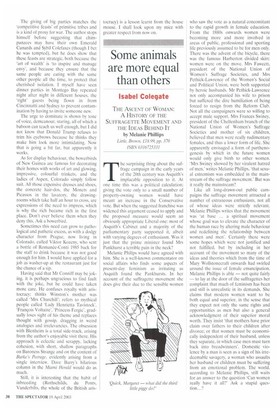Some animals are more equal than others
Isabel Colegate
THE ASCENT OF WOMAN: A HISTORY OF THE SUFFRAGETTE MOVEMENT AND THE IDEAS BEHIND IT by Melanie Phillips Little, Brown, £18.99, pp. 370 ISBN 0316725331 The surprising thing about the suffrage campaign in the early years of the 20th century was Asquith's implacable opposition to it. At one time this was a political calculation; giving the vote only to a small number of property-owning women would have meant an increase in the Conservative vote. But when the suggested franchise was widened this argument ceased to apply and the proposed measure would seem an obviously appropriate Liberal one: most of Asquith's Cabinet and a majority of the parliamentary party supported it, albeit with varying degrees of enthusiasm. Was it just that the prime minister found Mrs Pankhurst a terrible pain in the neck?
Melanie Philips would have agreed with him. She is a well-known commentator on social affairs who finds some aspects of present-day feminism as irritating as Asquith found the Pankhursts. In her account of the suffragette movement she does give their due to the sensible women
who saw the vote as a natural concomitant to the rapid growth in female education. From the 1880s onwards women were becoming more and more involved in areas of public, professional and sporting life previously assumed to be for men only. There was the advent of the bicycle, there was the famous Harberton divided skirt: women were on the move. Mrs Fawcett, president of the National Union of Women's Suffrage Societies, and Mrs Pethick-Lawrence of the Women's Social and Political Union, were both supported by heroic husbands. Mr Pethick-Lawrence not only accompanied his wife to prison but suffered the dire humiliation of being forced to resign from the Reform Club. Not all the campaigners were so willing to accept male support. Mrs Frances Swiney, president of the Cheltenham branch of the National Union of Women's Suffrage Societies and mother of six children, believed that men were really rudimentary females, and thus a lower form of life. She apparently envisaged a form of parthenogenesis by which in the future women would only give birth to other women. 'Mrs Swiney showed by her virulent hatred of men,' writes Melanie Phillips. 'that sexual extremism was embedded in the mainstream of the suffrage movement.' But was it really the mainstream? Like all long-drawn-out public campaigns the suffrage movement attracted a number of extraneous enthusiasts, not all of whose ideas were strictly relevant. Melanie Phillips writes that the movement was 'at base ... a spiritual movement whose goal was to elevate the character of the human race by altering male behaviour and redefining the relationship between women and men'. Certainly there were some hopes which were not justified and not fulfilled, but by including in her account of the movement so many of the ideas and theories which from the time of Mary Wollstonecraft onwards had swirled around the issue of female emancipation, Melanie Phillips is able — not quite fairly — to lay at the door of the suffragettes her complaint that much of feminism has been and still is unrealistic in its demands. She claims that modern women want to be both equal and superior, in the sense that they expect not only the same rights and opportunities as men but also a general acknowledgment of their superior moral worth. They insist 'that mothers have prior claim over fathers to their children after divorce; or that women must be economically independent of their husband, unless they separate, in which case men must turn back into breadwinners'. Domestic violence by a man is seen as a sign of his irredeemable savagery, a woman who assaults her husband or children must be suffering from an emotional problem. The world, according to Melanie Phillips, still waits for an answer to the question 'Can women really have it all?' Ask a stupid question...?


































































 Previous page
Previous page